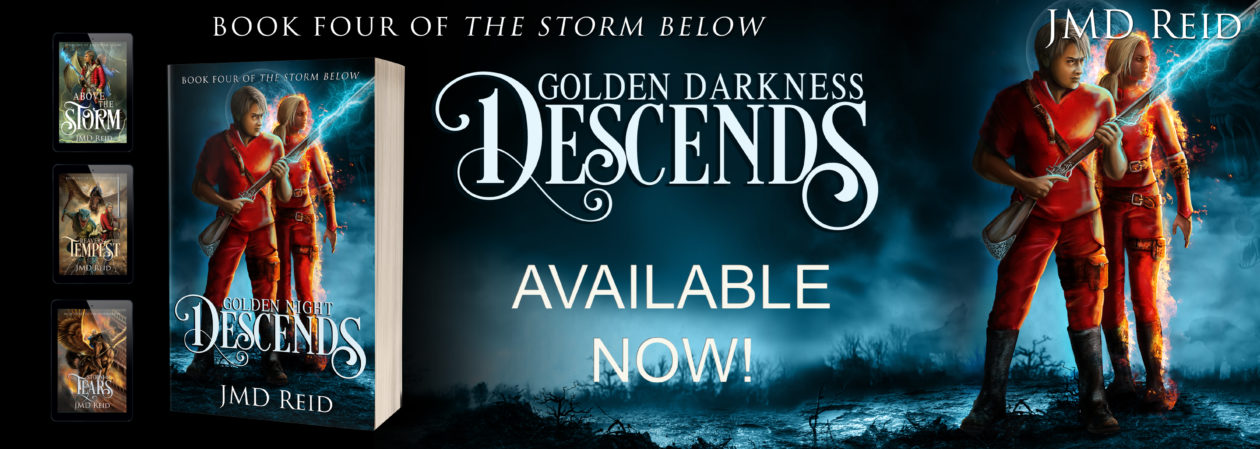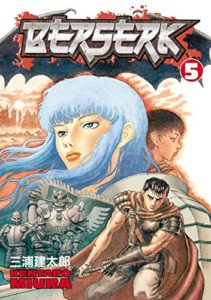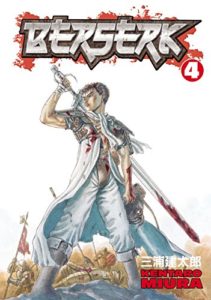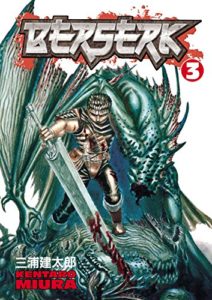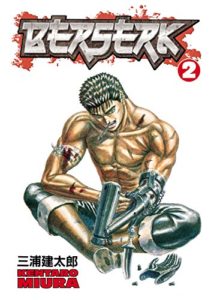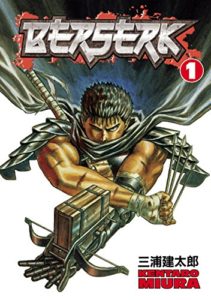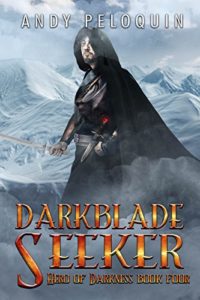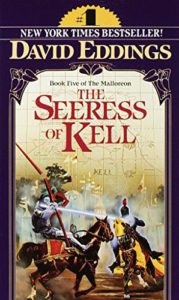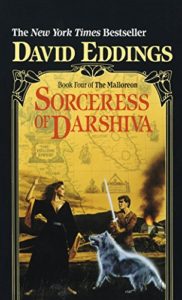Reread of Prince of Nothing Trilogy
Book 3: The Thousandfold Thought
by R. Scott Bakker
The Final March
Chapter 9
Joktha
Welcome to Chapter Nine of my reread. Click here if you missed the Chapter Eight!
In the skins of elk I pass over grasses. Rain falls, and I cleanse my face in the sky. I hear the Horse Prayers spoken, but my lips are far away. I slip down weed and still twig—into their palms I pool. Then I am called out and am among them. In sorrow, I rejoice.
Pale endless life. This, I call my own.
—ANONYMOUS, THE NONMAN CANTICLES
My Thoughts
The person speaking sounds like an Erratic to me, though his words were collected by a Human or perhaps humans translated the Erratic’s words into a human tongue. Note the emphasis on what the person is doing. It is all present tense. He lives in the present because the past is fading. The Horse Prayer comes from far away. He is running, searching, but all he finds is sorrow. And he enjoys that, because in sorrow he can remember his past life, those he loved and knew. Immorality is a “pale endless life.”
It is an intriguing quote to start a chapter with. It’ll make us think about the skin-spies. They move like the Nonman, but they don’t even have a past. They leave forever in the present, slipping from one identity from another. There life is endless and not just pale, but colorless.
This is an appropriate quote because, more than anything, this chapter is about the skin-spies.
Early Spring 4112 Year-of-the-Tusk, Joktha
Cnaiür awakes feeling older. It reminds him of a time he woke one time while out on the Steppes and discovered that someone had, in ancient times, carved a relief into a cliff he slept beneath. It depicted a king celebrating his victory including a captured Scylvendi “from another age.” As Cnaiür comes to, he hears a man (Conphas, though Cnaiür doesn’t realize this) speaking, saying he felt pity at the end of the Battle of Kiyuth. Then he amends and says he felt regret seeing the myth of the Scylvendi destroyed. “The world became weaker.” It lead Conphas to realize he could defeat any obstacle.
Cnaiür realizes he is lying bound on the ground . Cnaiür is still coming out of his concussion from his severe beating. Conphas rants how Cnaiür meant nothing, that only Kellhus should be the “sole object of the Empire’s concern.” Conphas realizes that fixating on Cnaiür was a mistake because “What are the abuses of flesh compared with glory?” Cnaiür thinks there is no glory. Conphas laments all the casualties he took taking Jocktha, knowing Cnaiür was behind the costly tactics of the defenders. He “almost” wished Cnaiür commanded at Kiyuth so Conphas could vanquish him, a god defeating a demon. Conphas says they are kin.
“Are you,” Cnaiür rasped, “a god?”
The man [Conphas] stood, looked at him [Cnaiür]. Points of lantern light rolled like liquid across the figures worked into his cuirass. His voice possessed a shrill edge. “I know you love me… Men often beat those they love. Words fail them, and they throw their fists into the breach… I’ve seen it happen many times.”
Cnaiür rolled his head back, closed his eyes for pain. How had he come to be here? Why was he bound?
“I know also,” the man continued, “that you hate him.”
Him. There could be no mistaking the word’s intensity. The Dûnyain. He spoke of the Dûnyain—and as though he were his enemy, no less. “You do not want,” Cnaiür said, “to raise arms against him…”
“And why would that be?”
Cnaiür turned to him, blinking. “He knows the hearts of men. He seizes their beginnings and so wields their ends.”
Conphas gets mad, accusing Cnaiür of succumbing to the religion. Conpha is angry because he thought he’d found a peer in Cnaiür, admitting he even thought of making Cnaiür his Exalt-General. Cnaiür is still confused as Conphas rants why he couldn’t elevate Cnaiür to such a rank because the army would mutiny, but he thought with Cnaiür he could “eclipse even Triamis.”
Now Cnaiür realizes who is before him. Memories come back to him as he notices a “god with a beaten face.” Cnaiür laughs, stunning Conphas. Cnaiür realizes the man was sincere about thinking Cnaiür was his brother, his equal. This makes Cnaiür laugh more, insulting Conphas, saying, “Your heart is shrill and your soul is plain.” He calls it a stupid idea. Conphas is too weak to be his brother. Conphas kicks Cnaiür in the head. He only laughs as Conphas retreats leaving the tent. Cnaiür feels himself “slipping between immensities—the earth that pressed so cruelly against his battered frame and the commotion of men and their fatal purposes.”
At last, something deep laughed within him. At last it ends.
General Sompas enters and cuts Cnaiür’s bonds, telling Cnaiür his Chorae is on the table. Sompas reveals he’s a skin-spy taking Cnaiür to Serwë. The skin-spy has no problem leading Cnaiür out of camp even though he’s wearing a captain’s uniform. Conphas’s discipline holds, and the soldiers know “Biaxi Sompas was his man.”
“Is it always this easy?” Cnaiür asked the creature.
“Always,” it said.
In the blackness beneath a stand of carob trees, Serwë and another of her brothers awaited them, along with eight horses laden with supplies. Dawn had not yet broken when they heard the first of the horns, faint in the distance behind them.
Conphas, hunting Scylvendi, is feeling terror a “word he had always regarded from the outside.” He doesn’t understand how Cnaiür makes him feel this way. He reflects that his race has an obsession with the Scylvendi despite their hatred, their imagination fired by their mystique. Because the Scylvendi have beaten the Nansur so many times, its made the Scylvendi seem more manly. Conphas sees that in Cnaiür, just like his soldiers who were afraid to fight him earlier at Jocktha. He was like Gilgaöl, the God of War, given flesh.
And now, after wrestling him to the ground like some lunatic bull, after the wonder of capturing him—capturing War!—he had simply vanished.
Cememketri said it wasn’t sorcery, and suggested “Faceless Ones” as they call skin-spies, especially since some soldiers reported seeing Sompas freeing Cnaiür. Learning that one had killed his uncle has caused Conphas to admit that they are not Cishaurim since it made no sense for them to kill their secret ally. However, he can’t quite believe that they’re from the Consult. He wonders if the Second Apocalypse was on them.
Terror. How could he not be terrified?
All this time Conphas had assumed that he and his uncle had stood at the root of all that happened. No matter how the others plotted, they but thrashed in the nets of his hidden-designs—or so he thought. Such errant! All along, others had known, others had watched, and he hadn’t the slightest inkling of their intentions!
What was happening? Who ruled these events?
Not Emperor Ikurei Conphas I.
Conphas’s realization that he isn’t alone, but has men who followed him, thinking that the “ability to cede voice and limbo to the will of another” was mankind’s great genius. To follow allowed them to join together and extend power, and since he was the Emperor, he controlled it. If things are simple, he could handle it. And he would start with Cnaiür. He imagines “killing a son of his ancestral enemy” was the first step to restoring the Emperor. He sees himself as a mighty as the rulers of old.
No wonder the savage had laughed!
Conphas thinks the Gods are behind this, resenting them like you’d resent “children of a different father.” He questions why he spared Cnaiür, struggling to under stand “what vice or vanity” stopped him. He cries for Sompas and asks if he’d like to be the Exalt-General.
The ingrate [Sompas] swallowed. “Very well, God-of-Men.”
How he [Conphas] missed Martemus and the cool cynicism of his gaze. “Take the Kidruhil—all of them. Hunt down this demon for me, Sompas. Bring me his head and that shall be your title… Exalt-General, Spear-of-the-Empire.” His eyes narrowed in menace as he smiled. “Fail me and I shall burn you, your sons, your wives—every Biaxi breathing. I shall burn you all alive.”
Serwë’s “preternatural vision” guides Cnaiür’s party through a woods at night. They need to put as much distance as possible before the sun comes up. Despite his beating, Cnaiür draws on a reserve “as inexhaustible as lust or fear.” His mind wanders and then he realizes Serwë is cradling his head on her lap and tending to his wounds.
She smiled and a ragged breath stole through him. There was such sanctuary in the lap of a woman, a stillness that made the world, with all its threshing fury, seem small instead of encompassing, errant instead of essential. He winced as she dabbed a cut above his left eye. He savored the sense of cool water warming against his skin.
When he reaches up to caress her face, he notices his bloody knuckles. He feels his wound sand coughs up blood. He mumbles that he’s forgetting something. Serwë agrees, saying its the one he hunts. “The murderer.” He then says he’s the murder and rants about how men just “ape their fathers” in an unbroken chain back to the beginning. But he’s free of his people’s customs.
She studied him for a moment, her perfect face poised between thought and moonlight. “Yes… like the one you hunt.”
What were these shallow creatures?”
“You call yourself my lover? You think yourself my proof? My prize?”
She blinked in dread and sorrow. “Yes…”
“But you are a knife! You are a spear and hammer. You are nepenthe—opium! You would make a haft of my heart, and brandish me. Brandish me!”
Another skin-spy asks what about him. At first, Cnaiür thinks the skin-spy is Moënghus, then he realizes it’s Kellhus. The fake-Kellhus asks what he is, and Cnaiür is confused by this madness, now thinking the skin-spy is Moënghus as it presses Cnaiür for an answer. Cnaiür wonders how long Moënghus has been building his power. His hate fills him as they press him for answers.
“The one,” Cnaiür grated, “that I hunt.”
“Yes,” Serwë said from behind. “The murderer.”
“He murdered my father with words! Consumed my heart with revelation!”
“Yes…”
“He set me free.”
Lust for Serwë surges through him. She opens her “fake-face” and reveals her true one. They kiss with her spider-like “fingers” hugging him. “As though within a fist, she held him to her hot mouth.” He lifts her up as “Moënghus” says they must flee. Horns sound.
Cnaiür and his group press their horses hard, knowing Conphas won’t spare him again. Worse, Conphas has already sent troops south to keep any word of Conphas’s resurgence from reaching the Holy War, meaning they had foes before and behind them. As they ride, Cnaiür learns that the skin spies are “the Last Children of the Inchoroi” and are “Keepers of the Inverse Fire” though they grow confused when he asks them what that means. They don’t complain about anything except their lusts for “unspeakable congress” and that they are falling. They trust Cnaiür because the syntheses “made them his slaves,” claiming to be his loyal dogs.
They carried, Cnaiür could see, the spark of the void within them. Like the Sranc.
Cnaiür realized that while men where like tress, capable of branching in many different directions, the skin-spies were “spears concealed in the thickets of human activity.” This gives them a poetic beauty to Cnaiür as he both envies, loves, and pities them. He talks and learns “Serwë” was a Scylvendi two hundred years and has been many people since. He asks who it she now.
“I am Serwë… your lover.”
By the third night, it’s clear Conphas is not giving up. He studies their campfire and is disturbed by the number. It’s a large patrol and he’s worried that the Nansur know he’s not fleeing to Caraskand and Saubon and has to eventually turn east for the Holy War. This means there will likely be soldiers hoping to cut them off. “It would be like shooting arrows in the dark, certainly, but his [the Nansur commander’s] quiver looked deep.” Serwë kills a goatherd who surprised them the next day. Unable to bury him, they are forced to carry his body, tiring their horses more. Soon vultures circle them. That night, they burn the body and keep going for another week, avoiding men save a village which “they plundered for sort and supplies.” One night, Cnaiür makes new swazonds for the men he killed then rants his madness at the skin-spies followed by weeping. The skin-spies don’t judge him, lacking humanity.
The pursuers continue and Cnaiür starts thinking as the Nansur as the abominations, not the skin-spies he rides with. He questions if he is insane, no longer sure what the word even means. The Scylvendi cut the throats of those who went “feral in the manner of dogs and horses,” seeing it in the same way while the Inrithi blamed it on demons. He remembers Achamian’s explanation (early in the Warrior Prophet) about how madness was “a point where the Outside penetrated the world” caused by men breaking from “the trials of the world.”
At the time, Cnaiür had been less than impressed. He had despised the sorcerer, thinking him one of those mewling souls who forever groaned beneath burdens of their own manufacture. He had dismissed all things him out of hand. But now, the force of his demonstration seemed indisputable. Something other inhabited him.
It was peculiar. Sometimes, it seemed that each of his eyes answered to a different master, that his every look involved war an loss. Sometimes it seemed he possessed two faces, an honest outer expression, which he sunned beneath the open sky, and a more devious inner countenance. If he concentrated, he could almost feel its muscles—deep, twitching webs of them—beneath the musculature that stretched his skin. But it was elusive, like the presentiment of hate in a brother’s glare. And it was profound, sealed like marrow within living bone. There was no distance! No way to frame it within his comprehension. And how could there be? When it thought, he was…
Cnaiür understands that he is exactly what Achamian described. Madness came either from something diving, making prophets, or the demonic, making men like Cnaiür. It matches up to Cnaiür’s perceptions. “The problem, of course, was the Dûnyain.”
He contradicted all of it.
Cnaiür had watched Kellhus herd men’s thoughts like sheep, using their emotions to goad and prod them. He did it all with “mundane word and expression.” Kellhus acted like the Outside couldn’t breach the world, that causality couldn’t be violated. With that “elementary assumption” he had dominated the Holy War. Cnaiür reels from the insight as he feels he is in two different worlds, one without the Outside and one with it. It’s comforting to be mad because something from the Outside crept in, but in a world without it, a closed world, the idea is horrifying. Cnaiür rejects that world, clinging to the fact that “there had to be more.”
Besides, he couldn’t be mad, he decided, because he possessed no origins. He had kicked free of all earth. He didn’t possess a past. Not really. What he remembered, he always remembered now. He—Cnaiür urs Skiötha—was the ground of what came before. He was his own foundation!
Laughing, he thought of the Dûnyain and how, upon their fatal reunion, this would overthrow him.
He tried to share his thoughts with the skin-spies but they could only offer “the simulacrum of understanding” because they lack any depths. He’s a bottomless hole. They are just biological machines, not alive, lacking souls. “They dwelt utterly within the world.”
And for no reason, his love of them—his love of her—became all the more fierce.
More days passes and they near the Betmulla Mountains. The sight reminds him of how he abused Serwë in the Hethantas and thinks hew as a fool for hurting her, a “free man trying to make himself a slave of his people.” He never could find the words to speak to her. Now he tells Serwë that they conceived their child in a place like those mountains.
They loose a horse in the rough terrain. They march into the night, the skin-spies preternatural sight guiding them. Cnaiür thinks their pursuers can’t catch up to them at this pace. The next morning, the skin-spies run down a deer and kill it. It proved a mistake to cook it as Serwë warns that men come, smelling them when the wind shifts. Two skin-spies vanish into the trees as he hears the sounds of approaching horses.
Cnaiür sprints at the Kidruhil, knowing Serwë would follow. The skin-spies attack from the trees, lifting men out of their saddles, and throwing their bloody bodies back down, panicking the soldiers. They retreat form them trees and drew their bows, which Cnaiür realizes are similar to Scylvendi and they use the same horsebow tactics as his people. Serwë jumps before Cnaiür, using her body to shield him. Now wounded, Serwë keeps being a human shield as the Kidruhil encircle them.
Somehow, Serwë was in front of him. For an instant she stood, a poised beauty, arms out, flaxen hair gleaming in the mountain sun—
She danced for him.
Shielding, leaping, striking. She kept her back turned to him, as though in observance of some ritual modesty. Her sleeves snapped like leather. Shafts clattered across the platform. Others buzzed about his shoulders and head. She dipped, rolled her arms about. A shaft appeared in the palm of her hand. She kicked, swung her heel down from her raised knee. A shaft jutted from her calf. The fletching of two more materialized in her back. She cartwheeled, kicked an arrow away even as three others thudded into her chest and abdomen. She cycled her hands outward, batted away four in succession, threw her head back, thrust out her arms, caught one in the back of her right hand. Another in her left forearm.
She jerked her head to the left. An arrowhead popped from the back of her neck. She whimpered, as a little girl might.
But she never ceased moving. Blood flew out in beads and lines, flashed in arcs beneath the sun.
Cnaiür can’t look away from Serwë’s dance. “His prize.” The Nansur retreat. Serwë slumps to the ground and stares at him before she pitches forward dead. He rushes to her, crying out in horror. “When he shook her, her perfect face fell apart.” He is numb, the battle over, the other skin-spies wounded but alive.
“We must bury her,” he [Cnaiür] called.
Serwë helped him.
My Thoughts
I’ve said this in the reread before, but it holds true: never meet your heroes. Well, also never meet your mythical enemies either. Reality is never as impressive as story and imagination. There is an illusion that all those people who came before us were stronger, wiser, tougher. And maybe they were, but they were also still human. Still weak and frail and prone to foibles and mistakes as us. But the further removed we are from them in space and time, the more their deeds can shine. It might have to do why the glamour and mystique of pop star has fallen so much in modern time from the glitz and glamour of the golden age of movies to the present where a drunk rich girl can have as much fame. Social Media lets us know people in a different, though equally false, way.
Conphas narcissism has allowed him to internalize his rape at Cnaiür’s hand and turn it back to bolster himself. It’s a rather impressive bit of psychology. He’s sitting at the center of a narcissistic black hole. Once past the event horizon, all paths in a black hole, every directions of travel, bends back to the center. That is why light can’t escape. Conphas is just like that, twisting any criticism or affront to his person back to enhance his own self-inflated opinion of himself.
Okay, Bakker, sometimes you need to look at your pronouns. “The man stood, looked at him strangely” is a sentence where the man appears to looking at himself (the man is Conphas and theNhim is Cnaiür). He’s a little looser with his pronouns then he should be. Just a nitpick that could produce a cleaner prose to read.
Wow. Conphas has interpreted that Cnaiür must love him because he beat him. Narcissistic black hole.
Kellhus brings Cnaiür back into focus. And not even mentioned by name. Just him. He still doesn’t realize he’s talking to Conphas, but he knows the conversation now. Kellhus makes sense to Cnaiür at this moment when his brain is shrugging off a concussion.
Conphas’s delusions have reached a peak. Cnaiür must be an equal. After all, Cnaiür beat him, raped him, dominated him. To preserve his self-importance, Conphas has to pour Cnaiür into the mold of Conphas’s personal reality. He’s convinced himself it is true, that Cnaiür will be thrilled to be his Exalt-General and serve a magnificent god. After all, Cnaiür “loves” him. Petulant, childish anger follows this rejection. First lashing out like a spoiled brat than running away to those who pamper him, his general staff.
Cnaiür is just ready to die. He thinks it’s coming and welcomes it.
Conphas’s disciplined his soldiers so well, they just obey his officers. Those soldiers probably came up with a theory on why General Sompas wore a different uniform, maybe debating it until the uproar happens.
If you wonder about this mystique of the Scylvendi Conphas muses on, just think about Navy SEALs or Spartan Hoplites or Zulu Warriors or Samurai. Groups festishized for their battle prowess until the man who did those acts is swallowed by the myth of them. And when they’re your enemy, when they keep beating you, it makes you feel better putting them at an even higher pedestal. Then it doesn’t harm your ego. This is exactly what Conphas did in miniature with Cnaiür, playing out their race’s history of the Scylvendi raping and beating them over and over, shattering their Nansur pride.
Conphas’s narcissism is stretching to its limits now. This shows us why such powerful people reject the idea of the Consult. Because it is something stronger than them, and their egos, especially a with man like Conphas, can’t allow that. Great characterization from Bakker. As he’s on the moment of panic, Conphas finds a new way to prop up his ego while simultaneously showing off something important: working together is one of the things that helped humans dominate our world. His black hole is working hard to bend everything, even Cnaiür’s mocking laughter, in on his narcissism.
I miss Martemus, too, Conphas.
I just want to add that I love the world preternatural and am always delighted to come across it in a book.
Interesting that lust or fear are shown to be inexhaustible. They are the two most base emotions that push and pull us. It’s another way of saying fight or flight. What’s fighting, if not defending what your existence to pass on your genes. Lust is survival. But so is fear. Both are necessary to see a species, if not an individual, survive.
Cnaiür is noticing that the skin-spies aren’t real people, just very good parrots at mimicking speech. They are like an AI that could pass a Turing Test (which we’ve achieved) even as the computer doesn’t understand the emotions behind it. The skin-spy just has a great deal of understanding on how to fake conversations by drawing on its database to assemble coherent sentences that sound like human speech and responses. Skin-spies only truly understand lust and violence, the most base of emotions. They fake the rest. She can never be Serwë, but will Cnaiür care?
Is this the first mention of the Inverse Fire in the story? What’s interesting is that the skin-spies don’t understand what it means to be the Keeper. They are programmed to say it, repeating their phrases, but they don’t have the knowledge to explain it. They only pretend to be autonomous creatures. They truly are chained by the Darkness that Comes Before.
Interesting that they skin-spies are Cnaiür’s slaves. Perhaps that’s how he survived. We know one is still hanging around him twenty years later.
Two hundred years the Consult has been working to ready the world for the Second Apocalypse and then along comes Moënghus and disrupts centuries of planning. No wonder they leaped at the chance to use the Holy War against him.
“They [emphasis mine] plundered the village for sport and supplies.” Cnaiür pillaged that village for fun with the skin-spies. Not the first village he’s massacred, but this time he’s not gripped by his madness.
The explanation that madness is something from the outside possessing a person is interesting. In a way, madness that breaks from the effects of the Darkness that Comes Before. They no longer respond to the world the way they should. Their minds have broken and something new, something alien, has crept in and altered how they work. I watched the movie Shutter Island last night, and a woman who drowned her own kids talked about how she had this bug crawling across her mind, tugging on her wires. She was aware that her madness wasn’t her, that it was something at once external to her core identity but still internal, trapped inside her skull, making her do things she didn’t want to do.
I think Bakker is showing us the true source of Cnaiür’s madness. He “possessed no origins.” Like the Dûnyain, Cnaiür has kicked free of the Darkness that Comes Before. He has made himself other than the rest of his neighbors. Something different. His mind works in different ways, it isn’t directed by the past as much as it should. It makes his thoughts aliens from other humans. Other. Where Kellhus only pretends to be normal at the surface level, Cnaiür does the opposite and tires to shove himself back onto those tracks he abandoned. The pair are foils and opposites of each other, both mad in their own ways, but one embraces logic the other emotion. Order versus chaos.
The skin-spies say they are Cnaiür’s faithful dogs, but they’re more like wolves and he’s their alpha. Bakker shows us this by having them hunt a dear like a pack of carnivores, showing us what they truly are.
Now the skin-spies are like apes, attacking from the trees, as violent as chimpanzees as they kill the Nansur soldiers.
We’ve seen someone catch arrows before. Kellhus did it, but he didn’t get hit. It is a good way to show that Kellhus just edges out a skin-spy on reflexes (though not strength), as we’ve seen in his past fights with them
Though Serwë only mimics being human, something we the reader know now from this very chapter, we are seeing her death through Cnaiür’s eyes. We are seeing his perception of her, so we find ourselves moved by her beauty and dedication to protect him, an almost maternal gesture on her part. The skin-spies claimed to be Cnaiür’s dogs, and she proves it here.
What a way to end the chapter. Cnaiür grieving over one Serwë only for a new one, who was moments before one of Serwë’s “brothers,” helped him bury the old one’s corpse. Identity is meaningless to the skin-spies. They are only surface level, but Cnaiür, in his madness, doesn’t care. It only matters that he has a Serwë with him. He grieves one while welcoming another. Just like he grieved the original and then found solace in her mimic’s arms.
Hi, if you like my Analysis, you can connect with me on Facebook and Twitter, and you can check out my short stories on Amazon! Also, please leave any comments or criticisms below! They help keep me motivated!
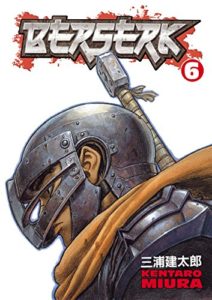 Thanks to Griffith’s leadership, and Zodd retreating from the battlefield after delivering his prophecy to Guts, the Band of the Hawk find themselves heroes. Griffith has the recognition of the king himself while attracting the notice of the king’s young daughter, Princess Charlotte. But such rise in station makes enemies.
Thanks to Griffith’s leadership, and Zodd retreating from the battlefield after delivering his prophecy to Guts, the Band of the Hawk find themselves heroes. Griffith has the recognition of the king himself while attracting the notice of the king’s young daughter, Princess Charlotte. But such rise in station makes enemies.